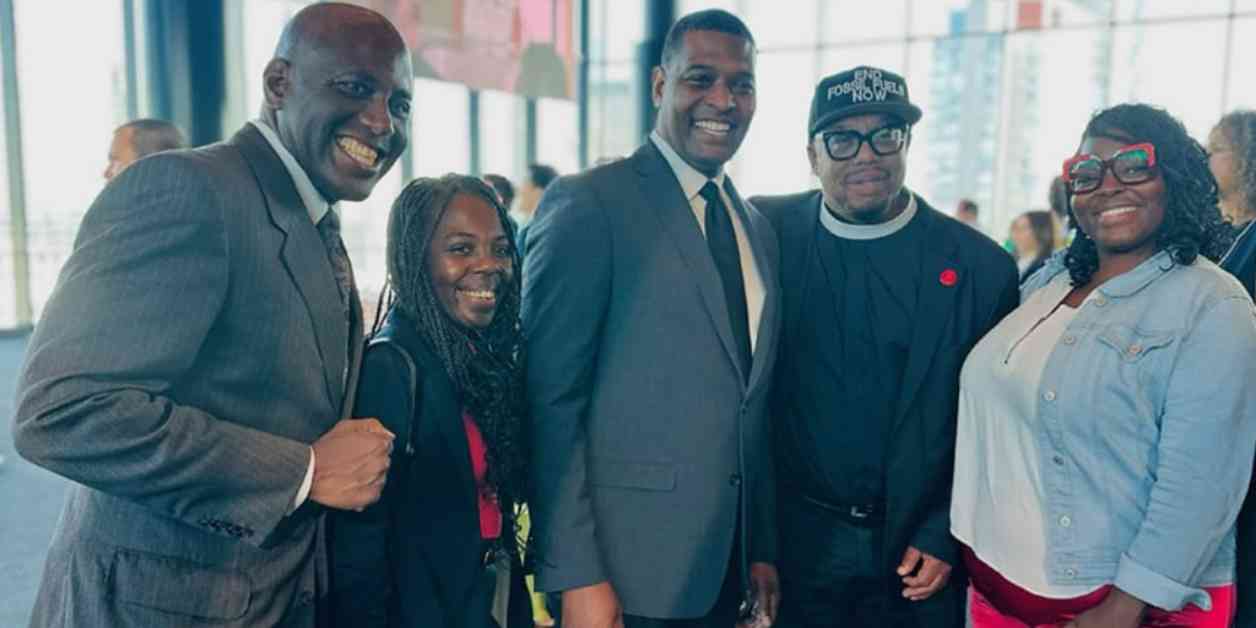President Biden’s Environmental Protection Agency (EPA) chief administrator is under fire after posing for a photo with a close associate of notorious antisemite Louis Farrakhan at the Democratic National Convention. The official in question, Michael Regan, was photographed alongside Terence Muhammad, the lead events and field coordinator for the nonprofit Hip Hop Caucus, during the event in Chicago.
Controversy erupted when Muhammad, known for his pro-Farrakhan social media posts, shared the now-deleted Facebook post praising the gathering of his “Environmental Justice Squad” and “Political/Social Justice Squad” at the DNC. In the post, Muhammad highlighted Regan’s presence and referred to him as an “AGGIE,” a term commonly associated with alumni of North Carolina Agricultural and Technical State University.
The Hip Hop Caucus, which aims to fight injustice and enact change, has been involved in key policy decisions within the Biden administration. President and CEO Lennox Yearwood, who was also photographed with Regan and Muhammad, has previously hailed Muhammad as one of Farrakhan’s “top soldiers” and expressed gratitude to Farrakhan for allowing Muhammad to be part of his organization.
Despite these associations, the Hip Hop Caucus has distanced itself from the Nation of Islam and condemned Farrakhan’s anti-Semitic statements. The organization emphasized its commitment to advocating for environmental justice and building allied relationships with communities dedicated to social justice causes.
The close ties between Regan, Yearwood, and Muhammad have raised concerns about the EPA’s partnerships and associations. While the EPA spokesperson Timothy Carroll defended Regan’s collaboration with the Hip Hop Caucus, critics have pointed to the troubling connections to Farrakhan and the Nation of Islam. The Anti-Defamation League (ADL) and the Southern Poverty Law Center (SPLC) have both denounced Farrakhan and classified the Nation of Islam as a hate group.
Regan’s relationship with Yearwood and Muhammad has come under scrutiny, especially in light of Yearwood’s multiple visits to the White House since Biden took office. The EPA’s repeated affirmations of support for the Hip Hop Caucus have sparked debates about the implications of aligning with individuals associated with controversial figures like Farrakhan.
As the controversy surrounding Regan’s interactions with Farrakhan associates continues to unfold, questions remain about the administration’s stance on combating hate speech and prejudice. The intersection of politics, social justice, and environmental advocacy in this context highlights the complexities of navigating partnerships and alliances in the pursuit of shared goals.
The Impact of Association
The photo of Regan with Muhammad at the DNC has reignited discussions about the consequences of association in today’s political landscape. While Regan may have been unaware of Muhammad’s ties to Farrakhan at the time of the photo, the subsequent revelations have prompted calls for accountability and transparency in the administration’s partnerships.
Critics argue that by aligning with individuals linked to controversial figures like Farrakhan, officials like Regan risk undermining their credibility and integrity. The optics of posing with someone who openly praises an antisemitic leader raise concerns about the values and principles upheld by the EPA and the Biden administration.
Moreover, the Hip Hop Caucus’s involvement in key policy decisions adds another layer of complexity to the situation. As a prominent advocacy organization focused on social and environmental justice, the Caucus’s connections to individuals with ties to Farrakhan raise questions about the alignment of its goals with those of the administration.
Evaluating Partnerships in the Public Sphere
The controversy surrounding Regan’s association with Farrakhan associates underscores the importance of carefully vetting partnerships in the public sphere. As representatives of government agencies and advocacy organizations, officials like Regan must consider the potential implications of their associations on public perception and policy outcomes.
In today’s hyper-connected world, where social media posts and photographs can quickly go viral, individuals in positions of influence must exercise caution when engaging with individuals or groups with controversial backgrounds. The scrutiny faced by Regan and the Hip Hop Caucus serves as a reminder of the need for transparency, accountability, and ethical considerations in forming partnerships.
Navigating Ethical Dilemmas in Public Service
The ethical dilemmas arising from Regan’s interaction with Farrakhan associates highlight the challenges faced by public officials in maintaining integrity and upholding ethical standards. While it is essential to engage with a diverse range of stakeholders to address complex issues, it is equally important to ensure that these engagements align with the values and principles of the organization or agency.
Regan’s partnership with the Hip Hop Caucus, despite its positive advocacy work, raises questions about the boundaries of collaboration and the potential risks of associating with individuals linked to controversial figures. As public servants, officials like Regan are held to high standards of conduct and must navigate ethical dilemmas with care and consideration for the broader implications of their actions.
In conclusion, the controversy surrounding Michael Regan’s photo with a Farrakhan associate at the DNC highlights the complexities of navigating partnerships and associations in the public sphere. As the chief administrator of the EPA, Regan’s interactions with individuals linked to controversial figures like Farrakhan raise questions about the administration’s commitment to combating hate speech and prejudice. Moving forward, it is essential for public officials to exercise caution and transparency in forming alliances and to consider the ethical implications of their associations on public perception and policy outcomes.





















